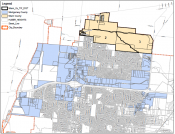Give $15,000 to Developers or $4,000 to longtime residents. How should your sewer funds be spent?
This lady's story is in the Dayton Daily News today, "Huber Heights homeowner seeks financial help from city".
You can see the discussion in the video of the Public Works meeting. To be up front, in the context of what is normally provided by cities for this type of repair, I am leery of the city providing help for just this one individual, nor would I support the kind of program council created last year for another individual that only that one individual took advantage of it. But when I look at it from the perspective of us giving away $15,000 to the developer in Carriage Trails while ignoring the needs of a longtime and loyal resident, I can't help but do a mental mind exercise to try and figure out, Why!!!!
From what I remember of this lady's history with the City, she has probably been paying taxes and water bills for most of the time it has taken to build the water and sewer fund balances to more than $12 million dollars. Yet the council decides to give between $15,000 to $22,000 to supplement the cost of the houses in Carriage Trails so this builder can get higher profits and to give a price break to people that may not have any connection to the city. And now those supplements are coming from the very same water and sewer funds that this lady has been paying into for all those years.
I understand the concept that Council members regurgitate in trying to justify handing out City money to this developer. It is possible for developments to attract people that make enough money so that the taxes they pay bring in more to the City than the cost it takes to provide them city services. But it is also possible that they don't. To date all I've asked for is for council to direct staff to bring to council a written report detailing the costs of this development versus the actual and projected revenue. Although it is great bragging rights to say we have the fastest growing development in the Miami Valley, if it costs us $1.10 for every $1.00 we gain, shouldn't we stop supplementing this development before it bankrupts us? How much does it cost us per house to provide police services and to make sure the fire and EMS services are available to residents? We know that the city diverted the Police and Fire levy on these houses to the TIF fund so these residents pay no property tax to support Police and Fire services. Give us a written report that details the income tax paid by these residents and how much it contributes to City Services in the context of the cost. I both expect a comprehensive written report and the necessary public discussion to make it complete. For instance, the written report should include the expected extra revenue to the city because we have more water costumers. But then if we are building water towers and adjusting lift stations those costs should be tracked and documented.
Everybody knows that cities don't pay to fix resident's sewer lines. This was my thought when I first heard this request. I still don't think that it would be right for the City to fix just this one person's sewer line. It would be especially expensive and eat up a lot of our water and sewer reserves if we did this for everyone. On the other hand, this council has borrowed $12 million dollars to pay for water and sewer lines of people that may not have ever paid a dime into our water and sewer fund. If they work in Dayton, they may never pay a dime of income or property tax to the City of Huber Heights. To me it seems obvious council needs to do a better job justifying why we have widows who can't live in their houses while at the same time they are making decisions to hand out city money to developers based on theories and hopes.
 Edited
Edited














Comments
There have been no comments yet